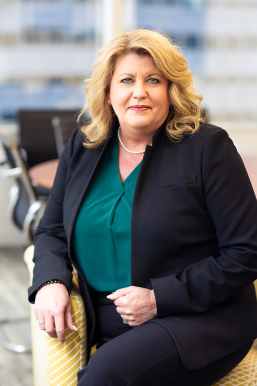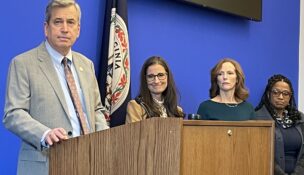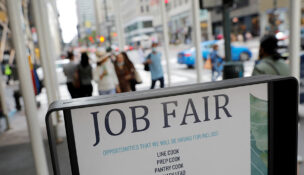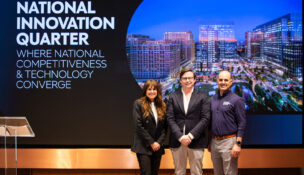
A tax associate at Keiter, Kate Austin, 22, had full-time job offers before she started her senior year of college. It’s a reflection of the pressing demand for CPAs amid a major staffing shortage. Photo by Shandell Taylor

A tax associate at Keiter, Kate Austin, 22, had full-time job offers before she started her senior year of college. It’s a reflection of the pressing demand for CPAs amid a major staffing shortage. Photo by Shandell Taylor
Out of balance
Accounting workforce shortage persists
Carol Hazard //March 28, 2024//
Kate Austin had a job waiting for her when she graduated last year from Christopher Newport University with a bachelor’s degree in business administration.
“I love it,” she says about her work as a tax associate at Keiter, a certified public accounting firm in Henrico County.
Unlike two of her friends, who are still looking for work — one with a degree in marketing and the other in graphic design — Austin, 22, is gainfully employed within her chosen career path.
“Outside of accounting, it’s very hard to find jobs, so I am very lucky,” she says.
While the tech industry is busy laying off workers, accounting firms are hustling to find people to fill their ranks, an ongoing problem.
According to the American Institute of Certified Public Accountants, the staffing shortage of CPAs has been brewing for more than a decade, driven by an aging workforce and fewer young professionals entering the industry. In April 2023, the institute reported that 75% of CPAs working then were expected to retire in the next 15 years. What’s more, the number of CPA exam candidates dropped 36% from 2010 to 2021.
Upping the ante to entice more people into accounting jobs, firms are offering higher wages, flexible work options and financial assistance to pass the notoriously difficult professional licensing exam.
Austin took accounting classes in high school and worked as an intern during college, cementing her future. She had a full-time job offer before starting her senior year of college.
Although her goal is to become a CPA, Austin needs to complete extra college credit hours and pass the Uniform CPA Examination. Keiter has reimbursed her for study materials to take the exam. In the meantime, she plans to pick up extra coursework at a community college.
“It’s not unusual to hire people who haven’t passed the exam,” says Gary Wallace, managing partner at Keiter, adding that in the past, however, workers were typically hired only after earning the extra credit hours. Now, Wallace says, “we are more flexible.”
Keiter has one office, where most of its 200 employees work, except for 15 remote workers across four states, including Virginia.
“We have been very aggressive in hiring,” Wallace says. Keiter employs two full-time recruiters: one for entry-level associates and the other for experienced CPAs.
‘Still critical’
Wallace tells students contemplating accounting careers that it’s “a great profession that offers job security and the opportunity to learn a lot about business.” He notes that the heads of two Virginia-based Fortune 500 companies — CarMax President and CEO William D. Nash and Markel Group CEO Thomas S. Gayner — are CPAs.

The staffing shortage has been challenging for years, says Stephanie Peters, president and CEO of the Virginia Society of CPAs (VSCPA). “We’re seeing a little more stability,” she says. “It’s less of a crisis of capacity, but still critical.”
The number of newly issued CPA licenses in Virginia has slid about 35% since 2008, when 1,434 licenses were issued, compared with 940 licenses in 2023, according to the Virginia Board of Accountancy. During the same time period, the number of first-time CPA exam takers in the state fell nearly 49%, from 1,823 to 931 candidates.
Despite the drop in Virginians becoming CPAs, licensing requirements remain basically the same. CPA candidates must pass a four-part, 16-hour exam within a 30-month period (extended from 18 months in December 2023). They also must accumulate 150 college credit hours, the equivalent of a master’s degree (30 more hours than needed for a bachelor’s degree). Starting this year, CPA candidates will also choose a specialty category within the exam: tax, audit or information technology.
About half of all first-time test-takers fail the exam.
“The CPA exam is really difficult to pass,” says Gary Thomson with Richmond-based Thomson Consulting. “Your first couple years [in the workforce] are consumed with not only trying to learn a new job but getting the CPA exam passed.”
Austin hopes to complete her exam by 2025 and accumulate the necessary course credits by 2026.
The accounting industry staffing shortage stems not only from fewer students pursuing degrees in accounting — a problem exacerbated by a persistent false image of accounting as boring or nerdy — but also by the wave of retiring baby boomers, shrinking the pipeline at both ends.
The problem is so acute that some public companies have disclosed potentially weakened internal controls in their financial reports, including Raleigh, North Carolina-based Advance Auto Parts (formerly based in Roanoke). The car parts provider said it had identified a potential material weakness in its internal financial controls because of accounting staff turnovers during the fiscal quarter ending April 22, 2023.
Payroll spikes
The short supply has led to high demand.
According to a January report of the top remote jobs in the nation from hiring site FlexJobs, more companies were advertising remote jobs for accountants in 2023 than any other position, with employers willing to pay $100,000 to $200,000 salaries for more experienced workers.
In Virginia, the mean salary for entry-level accountants was $51,121, according to the Virginia Society of CPA’s 2020 Compensation & Benefits Survey, which was conducted before more recent wage spikes. “Salaries increase from there,” the report states, “with first-level supervisors making a mean of $75,110 and partners a mean of $210,780.”
The payoff comes from working a few years and gaining experience, industry experts say. But all levels — from entry to experienced — are seeing wage increases.
The profession has awakened to higher wages, Thomson says. “Payrolls are up 38% over the last three years.”
Respondents worked in tax services, followed by audit, consulting and outsourced accounting or bookkeeping (a growing field in response to shortages)
“A lot of accounting firms are offshoring work,” says Peters. Most offshore workers hail from India, South Africa and the Philippines, she adds, and firms are putting safeguards in place to protect clients’ financial information.
While the accounting industry is seeking to fill employment gaps, it is also wrestling with “the age-old ‘all-they-do-is-taxes’ assumption,” according to a 2023 Stockton University report.
“A major challenge we are working on is the image that the profession is boring,” Peters says. “That image isn’t true, and we are trying to counter it with new messaging.”
Dozens of programs have been implemented in the past couple years at the state and national levels — including a VSCPA scholarship program — to attract more students into the profession.
Jennifer Wold, managing partner in Virginia for Forvis, one of the nation’s largest public accounting firms, says accounting is a noble occupation. “It is just as prestigious as other marquee professions such as law and medicine.”
However, it is misunderstood.
“We have not done a very good job of explaining what accounting is all about,” says Royce Burnett, professor and chairman of the School of Accountancy at Old Dominion University.
“Trust me, accounting is not about math,” he says. “It is about connecting the dots. It’s taking data, transforming that data into information and providing that information to stakeholders so they can make value-oriented, social- and business-related decisions.”
Accountants are not solely number crunchers as they were in the past, experts say. Technology has taken over a lot of the grunt work. Rather, today’s accountants are data analyzers, business consultants, risk advisers, financial records managers and tax preparers.
Entry-level salaries may be low compared with what workers might see in other sectors, such as technology, “but they grow exponentially compared to other majors,” Burnett says.
The message is difficult to convey when college graduates see their peers in other jobs initially making more money, though.
“The historical perception of the type of work and how we work — 70 to 80 hours a week during the peak tax season — is not necessarily the coolest picture to someone in high school,” Thomson says.
“It’s much more advisory in nature,” Thomson says. “Being a CPA is like being a priest or rabbi for a firm. You know the inner workings and become trusted advisers and, in many cases, close family friends.”
Accounting firms are heavily invested in technology, automation and process improvements, which may be more attractive to younger workers and help bridge productivity gaps among a reduced workforce. Artificial intelligence in particular will play a part in the industry going forward, experts say.
It may redefine roles, but it will not replace CPAs, Peters says. AI will be used in accounting to gather more information and analyze large amounts of data.
“It will help with expectations of regulators and others who want more and better information,” she says. However, “you still need human beings to make judgments, look for anomalies and make sure programs are doing what they are supposed to be doing.”
Recruitment drive
The question remains, nevertheless, about where the industry is going to find those human beings.
Academia is reaching out to students who may be looking at other career fields, Burnett says, even to liberal arts and STEM students. “We are engaging in ways never done before to reach individuals and go beyond traditional business students.”
Mark Lehner, who grew up in Chesapeake, had his sights set on becoming a lawyer. As an undergraduate at Bob Jones University in Greenville, South Carolina, he sought courses to develop skills in preparation for law school. He vacillated between taking engineering classes or general business classes but settled on something more technical — accounting. He hasn’t looked back.
“I enjoy the logic of it, the puzzle-solving,” he says. In effect, he applies financial rules in a business setting as opposed to legal rules in a courtroom.
Lehner, now 24, graduated in 2021 with 150 credit hours for his bachelor’s degree in accounting; he then passed his CPA exam in less than a year. He works as an audit associate for Forvis in Norfolk. “I enjoy the analysis,” he says. “There is an art to business.”
For many, the barriers to becoming a CPA are daunting, considering the extra time and cost on top of a college education and, in many cases, a heavy student debt load.
“The economic price to get 150 hours can be a barrier when you compare it to other industries,” Thomson says.
Rather than tacking on a fifth year of college as many did in the past, candidates often can work for a firm while taking classes.
Lehner took a different approach. He crammed as many credit hours as he could into each semester. “It was a packed schedule, but you get into the rhythm.”
Forvis, which employs about 6,000 people in 38 states, hired 500 people nationwide in January, including 350 interns — who will stay with the firm through mid-April during the busy tax season — and 150 associates.
Wold credits Forvis’ stepped-up recruiting efforts and rapid growth among the reasons for its success in attracting talent. Created from the 2022 merger of BKD CPAs & Advisors and Dixon Hughes Goodman (DHG), Forvis is acquiring Paris-based Mazars’ U.S. operation in June to become Forvis Mazars, a top 10 global professional services network.
However, Wold allows, recruiting still “is not easy in this environment” of heated competition for top talent. Forvis has particularly relied on internships as an outreach vehicle to give students an opportunity to experience public accounting firsthand while the firm can evaluate their performance and build a relationship with them.
“Our goal,” Wold says, “is for everyone to be successful and return to campus with a full-time job offer of employment after graduation.”
P

















